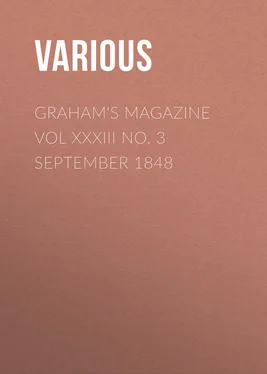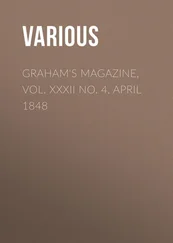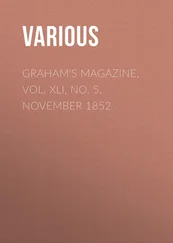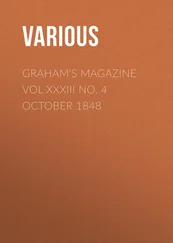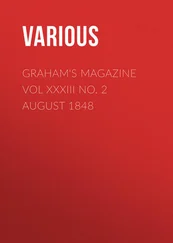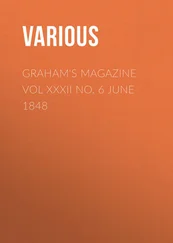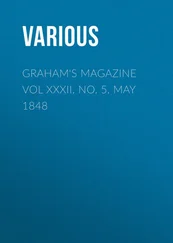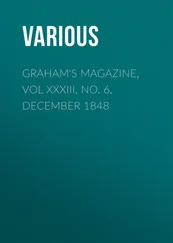Various - Graham's Magazine Vol XXXIII No. 3 September 1848
Здесь есть возможность читать онлайн «Various - Graham's Magazine Vol XXXIII No. 3 September 1848» — ознакомительный отрывок электронной книги совершенно бесплатно, а после прочтения отрывка купить полную версию. В некоторых случаях можно слушать аудио, скачать через торрент в формате fb2 и присутствует краткое содержание. Издательство: Иностранный паблик, Жанр: periodic, literature_19, foreign_edu, на английском языке. Описание произведения, (предисловие) а так же отзывы посетителей доступны на портале библиотеки ЛибКат.
- Название:Graham's Magazine Vol XXXIII No. 3 September 1848
- Автор:
- Издательство:Иностранный паблик
- Жанр:
- Год:неизвестен
- ISBN:нет данных
- Рейтинг книги:3 / 5. Голосов: 1
-
Избранное:Добавить в избранное
- Отзывы:
-
Ваша оценка:
- 60
- 1
- 2
- 3
- 4
- 5
Graham's Magazine Vol XXXIII No. 3 September 1848: краткое содержание, описание и аннотация
Предлагаем к чтению аннотацию, описание, краткое содержание или предисловие (зависит от того, что написал сам автор книги «Graham's Magazine Vol XXXIII No. 3 September 1848»). Если вы не нашли необходимую информацию о книге — напишите в комментариях, мы постараемся отыскать её.
Graham's Magazine Vol XXXIII No. 3 September 1848 — читать онлайн ознакомительный отрывок
Ниже представлен текст книги, разбитый по страницам. Система сохранения места последней прочитанной страницы, позволяет с удобством читать онлайн бесплатно книгу «Graham's Magazine Vol XXXIII No. 3 September 1848», без необходимости каждый раз заново искать на чём Вы остановились. Поставьте закладку, и сможете в любой момент перейти на страницу, на которой закончили чтение.
Интервал:
Закладка:
"Why every body says so, George," said Angila.
"Pshaw! every body's saying so don't make it so."
"But he's very attentive to her," replied Angila.
"Well, and if he is," retorted Mervale, "it does not follow that he must be in love with her. You women do jump to conclusions, and make up matches in such a way," he continued, almost angrily.
"I think she likes him," pursued Angila. "I think she would have him."
"Have him! to be sure she would," replied George, in the same tone; not that he considered the young lady particularly in love with his friend, but as if any girl might be glad to have him – for brothers are very apt to view such cases differently from sisters, who refuse young gentlemen for their friends without mercy.
"But he's ugly, you say," continued Mrs. Mervale, sorrowfully, who, old lady as she was, liked a handsome young man, and always lamented when she found mental gifts unaccompanied by personal charms.
"Yes, he's no beauty, that's certain," said Angila, gayly.
"Has he a good air and figure?" pursued Mrs. Mervale, still hoping so clever a man might be better looking after all.
"Yes, tolerable – middle height – nothing remarkable one way or the other." And then the young lady went off to tell some piece of news, that quite put Mr. Hazlewood out of her mother's head for the present.
When Angila next wrote to Augusta, although she spoke of Mrs. Carpenter's party, a little consciousness prevented her saying much about Robert Hazlewood, and consequently her friend was quite unsuspicious of the large share he had in making the party she described so pleasant.
Hazlewood had really been pleased by Angila. She was pretty – and he found her lively and intelligent. He had always been inclined to admire her, but she had turned from him once or twice in what he had thought a haughty manner, and consequently he had scarcely known her until they met at this little conversazione of Mrs. Carpenter's, where accident placed them near each other. The party was so small that where people happened to find themselves, there they staid – it requiring some courage for a young man to break the charmed ring, and deliberately plant himself before any lady, or attempt to talk to any one except her beside whom fate had placed him.
Now Angila had the corner seat on a sofa near the fire-place, and Hazlewood was standing, leaning against the chimney-piece, so that a nicer, more cosy position for a pleasant talk could hardly be conceived in so small a circle. Miss Morton was on the other side of the fire-place, occupying the corresponding situation to Angila, and Angila could see her peeping forward from time to time to see if Hazlewood still maintained his place. His back was turned toward her, so if she did throw any anxious glances that way, he did not see them.
Angila met him a few evenings after this at the Opera, and found that he was a passionate lover of music. They talked again, and he very well, for he really was a sensible, well-educated young man. Music is a favorite source of inspiration, and Hazlewood was a connoisseur as well as amateur. She found that he seldom missed a night at the Opera, and "she was surprised she had not seen him there before, as she went herself very often."
"He had seen her, however;" and he looked as if it were not easy not to see her when she was there.
She blushed and was pleased, for it evidently was not an unmeaning compliment.
"Mr. Hazlewood's very clever," she said the next day; "and his tastes are so cultivated and refined. He is very different from the usual run of young men." (When a girl begins to think a man different from the "usual run," you may be sure she herself is off the common track.) "There's something very manly in all his sentiments, independent and high-toned. He cannot be engaged to Mary Morton, for I alluded to the report, and he seemed quite amused at the idea. I can see he thinks her very silly, which she is, though pretty – though he was two gentlemanly to say so."
"How, then, did you find out that he thought so," asked George, smiling.
"Oh, from one or two little things. We were speaking of a German poem that I was trying to get the other day, and he said he had it, but had lent it to Miss Morton. 'However,' he added, with a peculiar smile, 'he did not believe she wanted to read it, and at any rate, he would bring it to me as soon as she returned it. He doubted whether she was much of a German reader.' But it was more the smile and the manner in which he said it, than the words, that made me think he had no very high opinion of her literary tastes."
"He may not like her any the less for that," said George, carelessly. "I think your clever literary men rarely do value a woman less for her ignorance."
But there was an expression in Angila's pretty face that seemed to contradict this assertion; for, like most pretty women, the was vainer of her talents than her beauty – and she thought Hazlewood had been quite struck by some of her criticisms the night before.
However this might be, the intimacy seemed to progress at a wonderful rate. He called and brought her books; and they had a world to say every time they met, which, whether by accident or design, was now beginning to be very often.
"You knew old Mr. Hazlewood, mamma, did not you?" said Angila. "And who did you say Mrs. Hazlewood was?" And now she listened very differently from the last time that her mother had launched forth on the topic of old times and friends. Angila was wonderfully interested in all the history of the whole race, for Mrs. Mervale began with the great grandfathers, maternal and paternal; and she kept the thread of the story with surprising distinctness, and made out the family pedigree with amazing correctness.
"Then they are an excellent family, mamma," she said.
"To be sure they are," replied Mrs. Mervale, "one of the oldest and best in the city."
It was wonderful what a quantity of books Angila read just about this time; but Hazlewood was always sending her something, which she seemed to take peculiar pleasure in surprising him by having finished before they met again. And her bright eyes grew brighter, and occasionally, and that not unfrequently, they had an abstracted, dreamy look, as if her thoughts were far away, occupied in very pleasant visions – whether they were now of Ossian-heroes, dark-eyed and dim, we doubt.
She was rather unpleasantly roused to a waking state, however, by a passage in one of Augusta Lenox's last letters, which was,
"What has become of your 'favorite aversion,' Robert Hazlewood? When are he and Mary Morton to be married? I give her joy of him – as you say, how can she?"
Angila colored scarlet with indignation as she read this, almost wondering at first what Augusta meant.
She did not answer the letter; some consciousness, mixed with a good deal of vexation, prevented her.
Hazlewood's attentions to Angila began to be talked of a good deal. Her mother was congratulated, and she was complimented, for every body spoke well of him. "A remarkably clever young man with excellent prospects," the old people said. The young girls talked of him probably pretty much as Angila and Augusta had done – but she did not hear that, and the young men said,
"Hazlewood was a devilish clever fellow, and that Angila Mervale would do very well if she could get him."
That the gentleman was desperately in love there was no doubt; and as for the young lady – that she was flattered and pleased and interested, was hardly less clear. Her bright eyes grew softer and more dreamy every day.
Of what was she dreaming? What could her visions be now? Can she by any possibility make a hero of Robert Hazlewood? Sober common sense would say "No!" but bright-eyed, youthful imagination may boldly answer, "Why not?" Time, however, can only decide that point.
Читать дальшеИнтервал:
Закладка:
Похожие книги на «Graham's Magazine Vol XXXIII No. 3 September 1848»
Представляем Вашему вниманию похожие книги на «Graham's Magazine Vol XXXIII No. 3 September 1848» списком для выбора. Мы отобрали схожую по названию и смыслу литературу в надежде предоставить читателям больше вариантов отыскать новые, интересные, ещё непрочитанные произведения.
Обсуждение, отзывы о книге «Graham's Magazine Vol XXXIII No. 3 September 1848» и просто собственные мнения читателей. Оставьте ваши комментарии, напишите, что Вы думаете о произведении, его смысле или главных героях. Укажите что конкретно понравилось, а что нет, и почему Вы так считаете.
